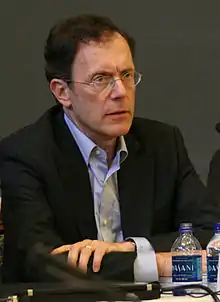Douglas Melamed
Arthur Douglas Melamed (born December 3, 1945) is an American legal scholar specializing in antitrust law. Since 2014, Melamed has been a professor, first visiting then professor of the practice, at Stanford Law School.[1] He was previously Senior Vice President and General Counsel at Intel Corporation and the chair of the Antitrust and Competition Practice Group at the law firm of WilmerHale.[2][3]

Early life and academics
Arthur Douglas Melamed was born on December 3, 1945, to Arthur C. Melamed and Helen Melamed in Minneapolis, Minnesota. Melamed graduated from Yale University with a Bachelor of Arts degree in 1967, then from Harvard Law School with a Juris Doctor degree in 1970, where he was an editor on the Harvard Law Review.
Career
After law school, he clerked for one year with Judge Charles M. Merrill on the U.S. Court of Appeals for the Ninth Circuit. By co-authoring a law review article on the different types of property rights accorded by tort rules and property rules in Property Rules, Liability Rules and Inalienability: One View of the Cathedral with Guido Calabresi, he became well-known in the field of law and economics for his views on the natural evolution of property rights. He served in the Justice Department's antitrust division under Joel Klein and was later Acting Assistant Attorney General during the Clinton Administration.[4][5] He then began working as the chair of the Antitrust and Competition Practice Group at the law firm of WilmerHale.[2] From 2009 to 2014, Melamed was the Senior Vice President and General Counsel of Intel Corporation; there, he oversaw Intel’s legal, corporate affairs, and government affairs departments.[3] In 2014, he became, and still is, a professor at Stanford Law School.[1]
Publicity
Throughout his career, Melamed has been interviewed by the media, mainly about antitrust law. In 2015, Corporate Counsel covered a story on Melamed titled '"The Michael Jordan" of Law now Focuses on Teaching'.[6] From May 2019 to June 2019, in particular, Melamed was interviewed by a variety of news outlets, including CNBC, as some antirust academics, regulators, and members of the public became concerned by the threat to competition large tech platforms may pose.[7]
References
- "Biography"
- "Intel Executive Bio", Retrieved April 30, 2010
- "A. Douglas Melamed".
- "#499: 10-10-96 - Douglas Melamed Named Antitrust Deputy".
- http://www.findarticles.com/p/articles/mi_m0EIN/is_2001_April_26/ai_73670141
- "A. Douglas Melamed, called the 'Michael Jordan' of law, now focuses on teaching". www.bizjournals.com. Retrieved 2019-06-18.
- "Antitrust Expert Doug Melamed on the New Probes into Big Tech". CNBC: Squawk Alley. 2019-06-13. Archived from the original on 2019-06-13. Retrieved 2020-04-23.